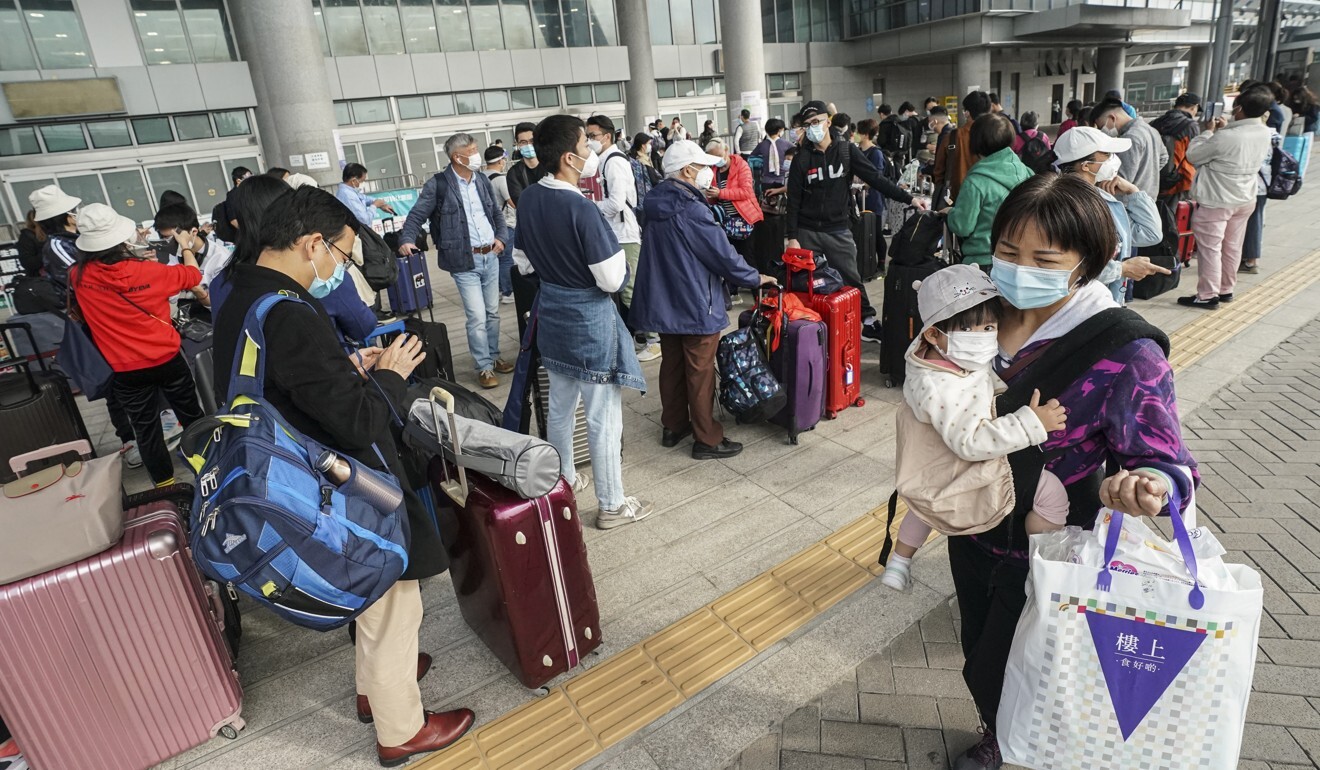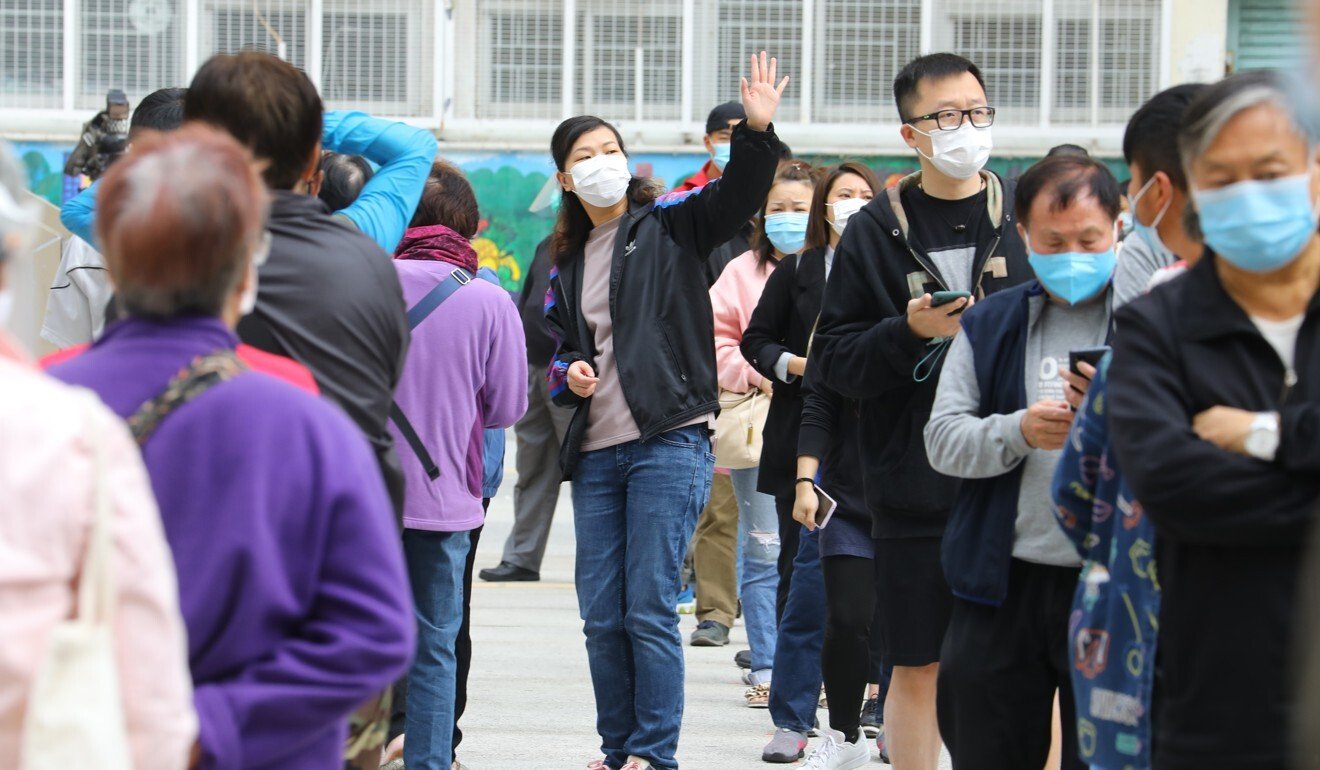
Sharp rise in Hong Kong residents heading across the border to flee from Covid-19 surge
- Tired of city’s pandemic restrictions, those going away say they need a break, don’t mind quarantine
- Almost 4,000 leaving daily for mainland and elsewhere this month, up from 1,680 in November
Taking two suitcases with them, Joe Pun, his wife and daughter left Hong Kong for mainland China on Wednesday, walking across the Shenzhen Bay border checkpoint.
The 40-year-old Hongkonger says the family used to make regular visits to Shenzhen, where they have a second home, but the Covid-19 pandemic and ensuing travel restrictions kept them in Hong Kong.
Pun used to own a restaurant, while his wife stayed at home to care for their 2½-year-old daughter.
As the city’s economy suffered a battering through this year, he was forced out of business recently. Pandemic restrictions also meant his toddler had to stay home from the nursery she attended.
After Hong Kong was hit by a fourth wave of Covid-19 infections in late November, Pun decided to take his family to the mainland, and was prepared for the mandatory two weeks of quarantine upon arrival there.
“The pandemic situation in Hong Kong is too serious. We want to stay safe elsewhere until it is over,” he says.
Pun and his family are among an increasing number of Hongkongers who have left for the mainland, especially since the surge in new infections recently, with daily confirmed cases topping 100. There have been more than 7,200 confirmed cases and 114 related deaths in Hong Kong as of Friday.

More than 31,000 Hong Kong residents left the city for the mainland and elsewhere from December 1 to 8, or a daily average of about 3,900, according to Immigration Department statistics. A total of 50,500 residents left the city in November, or an average of 1,680 a day.
Of those who left this month, a daily average of about 2,400 went through Shenzhen Bay, while about 280 took the Hong Kong-Zhuhai-Macau Bridge daily.
Hong Kong fourth wave: city faces more than 80 new Covid-19 cases
All but three mainland border checkpoints have been closed since February, with travellers only allowed to go there via Hong Kong International Airport, Shenzhen Bay and the Hong Kong-Zhuhai-Macau Bridge.
Many who left say that faced with the Covid-19 situation in Hong Kong, they were willing to endure mandatory quarantine on the mainland and pay for their hotel stay themselves. Being there allows them to visit family and not be cooped up at home.
The worsening health situation prompted the city’s government to enforce tougher measures this week to contain the coronavirus, including barring restaurants from dine-in services between 6pm and 5am, and closing beauty salons and massage parlours.
‘Family the priority now’
The coronavirus outbreak was first reported in China’s Hubei province, and after people in Hong Kong began falling sick in January, many Hongkongers wanted the government to close all border checkpoints with the mainland.
But as Beijing brought the coronavirus under control using mass testing and tough quarantine measures, there have been more voices in Hong Kong urging an easing of cross-border travel restrictions.
Since November 23, Hong Kong has allowed up to 5,000 residents to return from Guangdong and Macau daily without needing to be quarantined.
But the mainland remains hesitant to reopen the border to Hongkongers heading there, and those who go must be quarantined in designated hotels and pay themselves.
After Hong Kong saw a third wave of Covid-19 infections in July, neighbouring Guangdong province tightened entry requirements for travellers from the city, requiring those who cross the border to provide proof they had tested negative for the virus.
Undeterred by the restrictions, Hongkonger Tracy Chu, 38, plans to visit her husband and eight-year-old son in Shanghai next month, and stay there to spend Lunar New Year with them in February.
She had her son with her in Hong Kong, where he was a Primary Two pupil. But after schools were disrupted twice by Covid-19, she moved him to a school in Shanghai, where he now lives with his father, a 48-year-old mainlander who is a photographer.
In April, when Hong Kong schools were suspended, Chu took her son to Shanghai so the family could be together after months of being apart from her husband.

The mother and son were quarantined for two weeks when they crossed the border, and spent about two months in Shanghai before returning to Hong Kong in June as schools were preparing to reopen. They had to spend another two weeks in quarantine in Hong Kong.
However, after the spike in infections in July resulted in schools being closed early for the summer holidays, she took her son to Shanghai again in August, and enrolled him in a school there.
While on the mainland, she went to Guangzhou to visit relatives she had not seen all year because of the pandemic, and returned to Hong Kong alone last month.
Chu says her two trips across the border meant spending a total of eight weeks in quarantine, and she had to work remotely.
But her visits also left her feeling reassured that the pandemic was under control there and people’s lives were back to normal. More importantly, she says, being with her family and providing a stable, safe environment for her son are her priorities now.
“I don’t mind the quarantine or financial loss. Family is the most important,” she says.
Hong Kong clinches ‘groundbreaking’ deals for 15 million Covid-19 vaccine shots
Long wait to clear checkpoint
With more Hongkongers going to the mainland, long queues have become a regular sight at the Shenzhen Bay checkpoint, with many travellers waiting several hours before reaching the hotels where they will spend their quarantine.
Hongkonger Dicky Ying’s journey took all day when he visited his girlfriend in Huizhou, Guangdong, in September.
The 40-something CEO of a Hong Kong-based IT company says he arrived at Shenzhen Bay at 10am, but after completing all the procedures, including repeated temperature checks, he only got to his hotel at 6pm that day.
His two weeks in quarantine cost him about HK$4,000. The hotel, with about 12 floors and 10 rooms on every floor, was full of Hongkongers. He spent the time working on his laptop and watching television.

“I felt helpless. I had no other options,” says Ying, who used to visit his girlfriend, a mainlander, every week. Despite the inconvenience and cost, he is heading there again later this month to spend her birthday with her.
Businessman Nick Wong and his wife Emma Leung, both in their 50s, are planning a trip to Zhuhai in Guangdong this month.
The couple bought an apartment in Zhuhai a few years ago and used to travel there regularly, whenever they wanted to escape Hong Kong’s bustle.
But since the pandemic arrived in the city in January, they have stayed put in Hong Kong with their two adult sons.
They are heading there again because they need some time away. They have been feeling overwhelmed by work, the constant stress from the fear of infection and being confined for almost a year.
“It’s good to take a break after all that we have experienced this year,” Wong says. “Hopefully the pandemic will be over soon, and we can get our normal lives back.”

